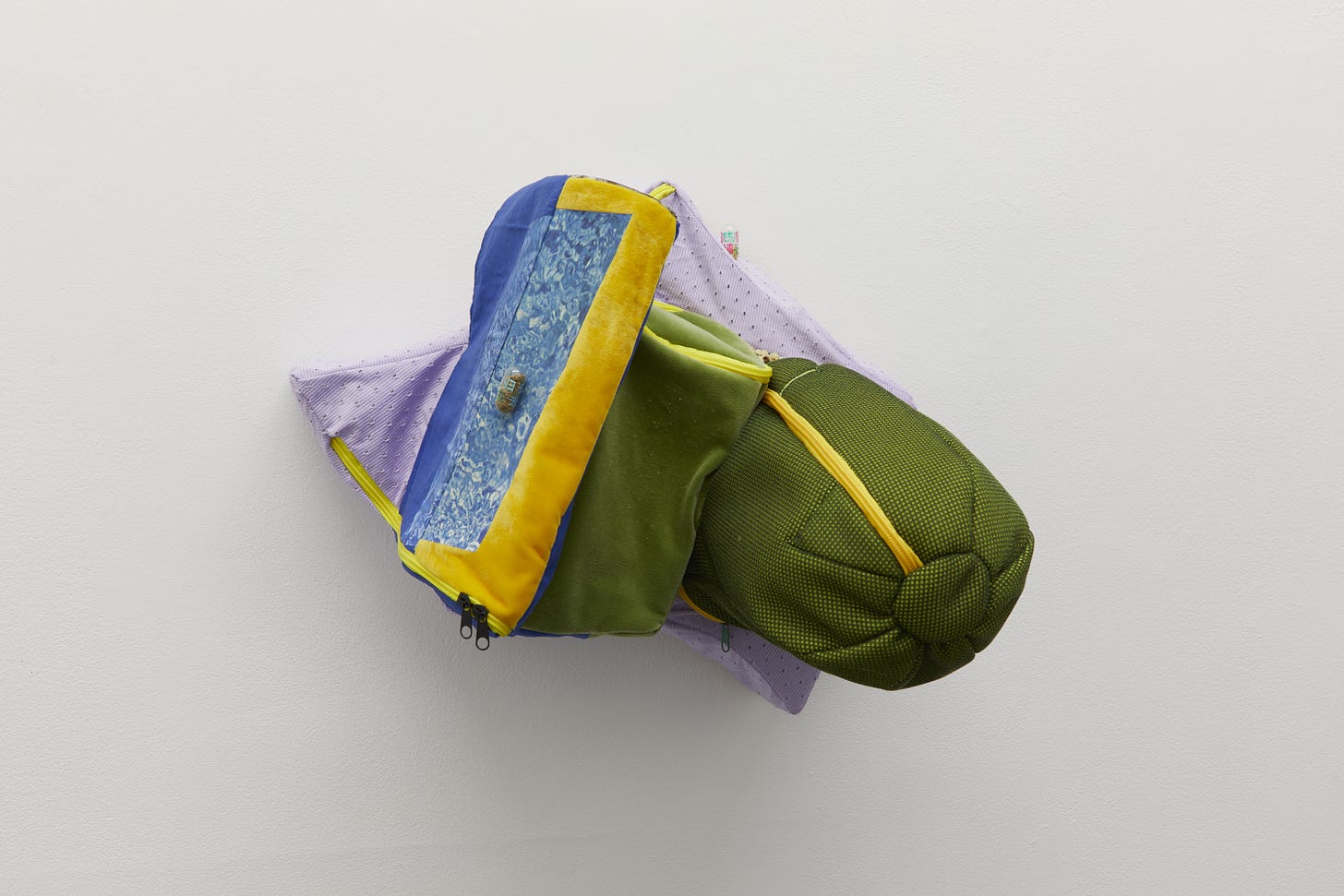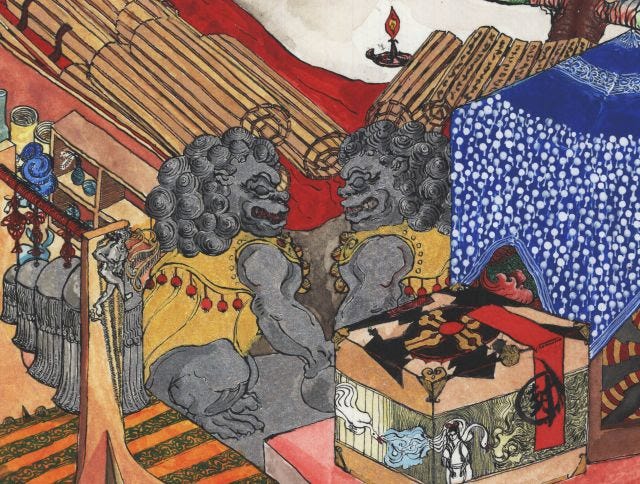Cultural maelstroms in capsules and the transnational artist as ‘conduit’
New York-based, China-born artist Xinan Ran asks 'what is real, and what is fake?' as she searches for the point where trauma, nihilism, and humour converge
Interloper Hack
Hi Xinan, thanks for being our inter mundus debut feature! So, tell me, why are we meeting today through our computer screens?
Xinan Ran
I’m a New York-based artist from China, and I’m interested in, as you described it, what it means to have so much cultural noise coming at us from all angles, and how we fight our way out and figure out what we actually want.
That's kind of how I experience my everyday life and how I make my work.
Interloper Hack
Awesome.
First, let me tell our worldly interlopers your story:
Born in Inner Mongolia, Xinan Ran’s family moved to Quanzhou, then Suzhou when she was six.
Always in motion, always regenerating
As a kid, she accompanied her mother as she was job hunting between cities in Southern China. Some of Xinan’s earliest memories are of train rides and hurtling bus trips. Other memories from her school years include reading lots of manga and Chinese pulp fiction, and collecting and archiving the eraser shavings of fellow students.
At 17 she won a spot on a scholarship in Canada alongside one hundred other international students, where she realised how “small and limited” her understanding of the world had been, and started thinking about the untranslatability of languages.
She moved to New York in 2013, went to art school in Brooklyn, and developed an art practice that, as she describes it “searches for the point where trauma, nihilism and humour converge”.
Obsessed with language, and ever the collector of traces of things, she got into the habit of jotting down words and phrases she came across in day to day life, from overheard conversations to Amazon reviews and Youtube comments.
Xinan Ran
I like the idea that none of the texts are generated by me. I always know there is a source of the text coming from outside and I'm taking it in and regenerating it.
This vantage point as a Chinese ‘content’ consumer repurposing these phrases offers American audiences the opportunity to experience text native to them through the eyes of an outsider. She’s, essentially, acting as a conduit.
Xinan Ran
I’m very aware that when I am working in America, I am making work for an American audience. When I am in China, I work very cautiously for a Chinese audience. My work always has a designated audience in mind.
Every time I finish a work that has one of the phrases I will just cross that phrase out in my running notebook. But then I constantly added on new words.
Interloper Hack
How does your messaging change when you're addressing a Chinese audience?
Xinan Ran
It's more subtle. Chinese appreciate traditional culture. So the starting points are always about how it's kind of in the disguise of how traditional culture is being interpreted in a new way. But then I hide messages inside that.
In one project I did in Shanghai, for example, I wrote a Chinese phrase in different types of soil. The phrase read “we live side by side with our enemies from the past” . It’s an expression that alludes to the Cultural Revolution, while also asking questions about how we can continue to co-exist after conflict and intergenerational disconnection.
The ‘Great Proletarian Cultural Revolution’ began in 1966, killed around two million people, and spelled a decade of brutality and chaos as Mao Zedong sought to reassert control over the Communist Party by calling for a purge of so called ‘counter revolutionaries’ who he claimed were plotting to create a ‘dictatorship of the bourgeoisie.’
The student-led ‘Red Guard’ was urged by Beijing’s propaganda arm to ‘clear away the evil habits of the old society’ to destroy the four ‘olds’: ‘old ideas, old customs, old habits, old culture,’ unleashing turmoil of civil war proportions.
I wrote other benign and calm phrases in the same place. Many people in the neighbourhood were suspicious when the project first started, but when I added the contentious phrase, the audience was surprisingly understanding and protective (of my work). The neighbor upstairs to me even took a photo and shared it with me.
People understand what you are doing, but they won’t say so out loud. I have to kind of guess what people's reaction to them is by watching them really closely. It’s a very different experience to addressing an American audience.
“It was the first time I felt animosity towards a plant”
Interloper Hack
So let’s talk about your latest show, 7,000 seeds, at gallery Essex Flowers. Walk me through it.
Xinan Ran
Sure, at the front there are eleven gelatin capsules, each three inches tall and with words on them that I’ve painted with nail polish. In the back there’s a painting inspired by a hallucinatory breathwork session, alongside some sculptures of cushions.
The show is about the concept of ‘invasive species’. We need to revise the term. It reflects negatively on the relationship humans have to nature.
Each capsule is filled with the same type of seed found during the 2020 “seeds of terror” -- the surreal event where a Chinese Amazon seller sent seeds to homes across the U.S. At the height of the pandemic, and in the wake of the ‘murder hornet invasion’, what turned out to be a harmless brushing scam unleashed panic across the country.
I found out what kind of seed was used on the USDA website. I went to Chinatown open market, and found the same type of seed, sealed in a Chinese package. It made me think about how one thing coming into the country is treated and how different generations of Chinese comie to New York. They came in ships to build railroads and to work in the garment district, and now they are international students coming for school.
The first time I learned about the term “invasive species” was in my hometown, when I was in grade school. A professor pointed at a Canadian goldenrod (a flower) and said “oh that’s an invasive species, It’s taking over and it’s very bad.” And then we were all really upset with it, this information completely changed our attitude to it. It was the first time I felt animosity towards a plant.
At the back of the exhibit there’s a drawing I did that came as a vision I had during a breathwork session, where I imagined myself in past life as a soldier holding a bucket of explosives as a last line of defense from the enemy troop. I blew myself up to protect the integrity of the kingdom.
In China, whenever a dynasty changes, the dynasty before gets destroyed. It’s normal for us to have this fear of the unknown, and the sense that what’s coming next will be worse, and to want to keep our resources for ourselves or to destroy them so the other side does not get them.
Crosscultural cognitive dissonance
Interloper Hack
You speak very rationally and at a distance about this impulse to exclude. But how does the threat of being excluded, from the perspective of an ‘outsider’ in the U.S. feel?
Xinan Ran
I’m in the art bubble in New York, it’s pretty diverse, very supportive of Asians artists at the moment. I feel more excluded when I’m in Hong Kong, and I don’t know how to exactly describe my feelings when talking about Hong Kong. Is it a weird feeling of guilt of not being able to do much about it and feeling of being inferior and powerless?
When I was in Canada, my Hong Kong friend first showed me the “Tank man” video of Tiananmen square. I hadn’t thought of it as a prominent incident before.
In ‘89, student-led protests at Beijing’s central square ended in massacre. A taboo topic of discussion in mainland China, Hongkongers have commemorated the event every June 4 with peaceful demonstrations that are now illegal.
When talking about issues such as Hong Kong we as Chinese face this instilled national pride that makes us feel like you have to be a national ambassador. It’s so ingrained.
Interloper Hack
How do you feel about how the U.S. media portrays China?
Xinan Ran
I think China doesn’t care to be understood at the moment. They’re promoting self-reliance. They were not letting journalists into China during Covid, so there’s way less news than before. In a way, if the media doesn’t talk about it, people don’t care about what’s happening inside China.
Interloper Hack
What about TikTok? People are talking about that?
The ubiquitous short form video hosting service, owned by Chinese tech giant ByteDance boasts more than 150 million U.S users, according to CEO Shou Zi Chew, who has been standing trial in Congress countering claims from the FBI that TikTok poses a threat to national security.
"We rely on global interoperability, Chinese engineers have access to data," said Chew as he faced a bludgeoning of questions from “the most bipartisan committee in Congress” which had united around wanting TikTok banned.
Xinan Ran
I don’t use TikTok, and I don’t actually know what to think about it. I think the Congress is overreacting. Adults think the platform is damaging for kids, but our generation is like every generation exposed to new media forms. We’re not stupid.
I think the Big Brother machine is reactive in nature. And it’s very much based on regional politics. It’s like in America, people in different regions get treated in different ways simply because of different local rules and regulations.
“Artists have the maximum type of freedom”
Interloper Hack
How has your art-making impacted your sense of self vis-à-vis place?
Xinan Ran
I think it gives me a kind of meaning. I grew up with Japanese Manga, I was so into it, but had to write a goodbye letter to her and told my parents I would never make a living out of art. When I came to New York, I realised once you get to know a person and feel their work is genuine, no matter how weird it is, the art makes sense. Artists have a type of freedom that I think is the maximum type of freedom. It feels so good.
Interloper Hack
And how does that tie to your sense of place and identity?
Xinan Ran
it requires me to constantly check back. I have the brain of a Chinese person but adapted enough to live in America. It requires me to constantly check with myself, to confirm what it is I am encountering.
Interloper Hack
What is it that needs confirming?
Xinan Ran
I think the art helped me to confirm that my status as not confirmed. I don't have a fixed status. I don’t feel sad about it. I feel satisfied, but I don't feel settled.
Interloper Hack
And how does that express itself in your work?
Xinan Ran
It’s the constant existence of two different voices and opinions. And, well, my art has always been very transitory, which is great for shipping internationally. Everything I do comes with the strategy that I need to host it in a small space in case I need to move.

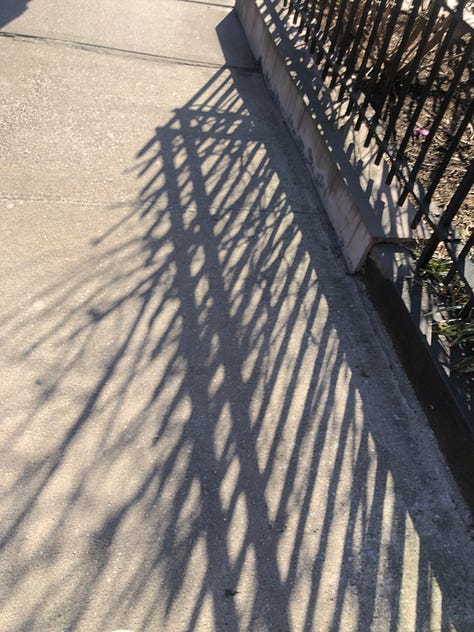
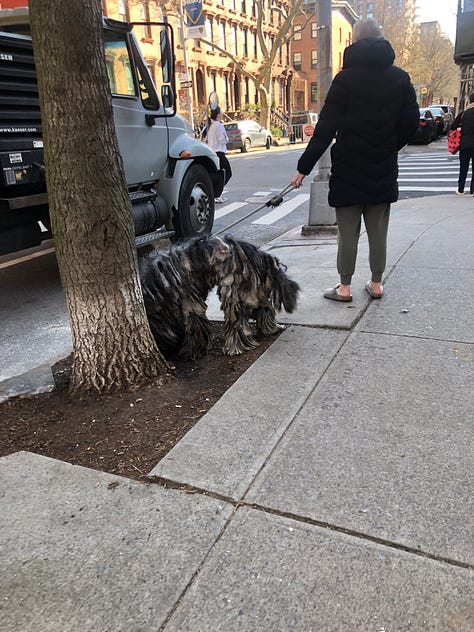


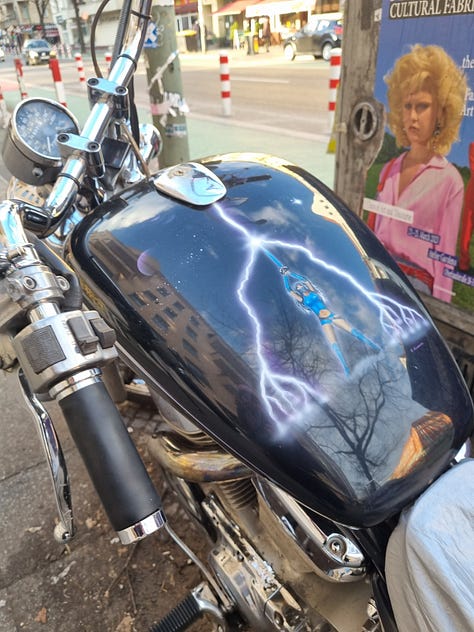
Living in a double world
How would you describe your aesthetics and influences?
Pretty Western and contemporary. In my first two years in undergrad, I was trying to make work that is difficult for other people to figure out the race of the artist.
I wanted to be as invisible or as ubiquitous. Other Chinese artists I knew were making works with prominent iconography, like painting Buddhas and stuff like that. Like, there’s so much more to our culture beyond the surface level of representation. That gave me a push towards non figurative, (as opposed to) icon-based work, which though I think it's an important way to have a dialogue, I want to do something different. I want to surprise people. (Also I suck at Chinese art. My handwriting is terrible. I thought “I better go somewhere where technique doesn’t matter!’)
I've been slowly reading books of Austrian philosopher Ivan Illich, who was also in New York and Puerto Rico in the 50s and 60s. For a while he was helping the Vatican but then he got kicked out because he was too weird. He described himself as “half moon, half traveling salesman”. I read his work in English, but I wish I could read it in German.
Oh, don’t bother, it’s a horrible language
Ha ha, OK.
Well, as I said, I used to also read a lot of Manga. So much of it, you have no idea. It made me have this unrealistic desire to go to the west, about this ideal western man that doesn’t exist. Men in Manga don’t look Asian, they look white. That’s why white people are so good at cosplaying. It’s taken me a while to see how unrealistic it all is.
So, would you say you’ve decolonised yourself?
Yeah, that’s it.
A previous Hong Kong artist I spoke to described this decolonisation process as an imaginative act of weaving together fact and fiction in looking towards the future. Does this idea tie in with your work at all?
I don't want to leave a trace. Learning more and more about how much of the history I grew up around was fake. I am very suspicious about things in general, and am very careful when I leave a mark. I want to be more present, just archive what I need to.
And yet, the very process of making art is about leaving traces
But not in the archival sense. My gelatin capsules, for example, will disintegrate in the next few years. I like the idea of artwork as a story. Tales and stories may get passed down erroneously but in a way that gives it a new life. Thinking about this makes me think, what is real and what is fake, really?
Especially living in China. The only thing you can do is to quickly screen grab some stuff before it goes away quickly. And the rumours turn out to be true or the official announcements turned out to be fake. And kind of constantly knowing that the fake isn’t real doesn’t really matter. Like when I know something my parents don’t know. Some disaster happened or something. How can I convey this distrust and sadness to my parents? It’s impossible.
It’s like we are living in this double world where their truth is my fiction and my reality doesn’t get converted to them. There’s a gap that can’t be crossed. It’s a weird thing to say.
Find out more about Xinan Ran’s work and show at Essex Flowers, and thanks for reading!




